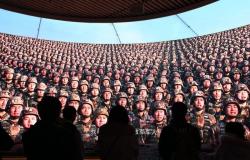
The survey brings many worrying data. Among them I have selected some more important ones:
- The study also shows that 72% of young people in Romania are not at all interested or to a small extent interested in political life in Romania.
- 68% of young people in Romania think that the country is going in the wrong direction, while 28% say that things are going in a good direction.
- 95% of young people in Romania do not trust political parties.
- 42% of young people in Romania say that they get information from social networks (Facebook, Instagram, TikTok, Whatsapp, Telegram, etc.) (source).
We actually see a visible trend as early as 2022, when an Avangarde survey showed that 36% of those who said they voted with AUR were between the ages of 18 and 30 (source). Now this orientation of young people towards populist parties is confirmed. At the same time, we see a distrust of “the direction in which the country is moving” doubled by a deep distrust of parties and a major disinterest in politics.
For a better understanding of these phenomena, we talked with two still young sociologists who follow this phenomenon.
“The younger generation seems to be more and more conservative”
Vasile Ernu: The figures tell us that there is very little trust in the parties, a low interest in politics and a concern about the direction the country is going. What would that mean?
Florin Poenaru – sociologist, lecturer at the University of Bucharest: On the one hand, it means that the society their parents built does not resonate with the needs and expectations of young people. I hear this frequently from my students in my class on generations and culture wars: they don’t like the way the world they live in looks at all, hence all kinds of nostalgic returns or forms of escapism. On the other hand, young people are the product of the society that formed them and therefore express its characteristics. Very low trust in political parties and low interest in politics are cross-generational characteristics in Romania. Reluctance (or even disgust) towards politics is cultivated by politicians in order to keep potential rivals at bay and thus monopolize the mechanisms of political reproduction. At the same time, the de-politicization of society expresses a broader trend: the erosion of collective civic life. Before 1989 this erosion was masked by formal participation in the activity of the PCR or in the actions organized by it. After 1989 and almost 40 years of neoliberalism, we can hardly speak of collective forms of politics or public participation.
Fierce individualism and the logic of the market have prevailed at the level of society to a very large degree, but which I do not think is still realized yet. This is a frustration of young people that is never expressed as such, precisely because the language and distance necessary for this do not yet exist.
In Romania, as in most western countries, mass politics and mass organizations are in deep decline. It’s just that, for historical reasons that deserve to be detailed another time, the phenomenon is very important in our country: not only do parties no longer rely on large numbers of members, but their existence would be harmful to the internal hierarchy. The trade unions, which anyway rather resist the state, in the sectors with many employees, do not fulfill the role of coagulation of public energy either. Moreover, their leaders are viewed with suspicion even by trade unionists. The largest trade union federation in Romania has just over 150,000 members. Cultural, sports, civic organizations that bring together a large number of people do not exist. Tenants’ associations are probably the only institutions that Romanians belong to in large numbers. The domestic institution that offers the opportunity for collective participation is BOR – but even there only at certain events, not constantly. The rise of social media has accentuated the decline of collectivity and imprinted a new way of thinking about how to participate in society. Perhaps young people feel alienated and pessimistic in such a highly individualized and atomized world. At the same time, however, the latest World Happiness Report shows that Romania is in 8th place for the happiest place to live, according to the evaluations of respondents under 30 years old.
– Do you think there is a temptation for the young people this right-wing populism once AUR is their first get? What are they actually voting for?
– Young people usually don’t vote much, or only small percentages do. The percentage of young people in the total population is declining anyway, which means that their political and electoral power is diminished. We live in a world built and driven by the near-retirement decrees. Their influence will be decisive in the final score of AUR, not the youth. Probably for young people AUR resonates through the anti-system energy it releases (how real this anti-system is is another conversation). In addition, the younger generation seems to be increasingly conservative, so perhaps there is an attraction from this point of view.
– Why would young voters go to such parties and not to traditional parties?
– For the same reasons as above: no one goes to the traditional parties anymore, neither as a member nor as votes cast. In the last parliamentary elections, almost 70% did not vote. Parties are not looking for mass memberships, nor do they have anything to offer members. Parties have become mostly vehicles for leaders, with anemic internal structures. I don’t think that a party in Romania could mobilize enough supporters to fill a stadium. The local leaders of the traditional parties (almost the same, regardless of the party’s logo that they change) end up in positions that control the public budget at the end of elections where they don’t win more than a few dozen-hundred votes in the communes and a few thousand in the cities big. Young people, like society as a whole, are missing from the political-electoral landscape. GOLD, on the other hand, at least rhetorically, brings into the mainstream the experience of social networks that have become hegemonic and are practically synonymous with society. George Simion is a tiktoker, not a politician. On the other hand, because politics and society are now structured according to the model of the social media experience, and the attention span is short, the cost of supporting or not supporting a candidate or a new political formation is very small.
Trends have come to last for hours, not days. That’s why I’m quite skeptical that the forecasts of the cited poll will materialize in the vote. Voting has the disadvantage that it is still in the material world.
– Do you know if these trends are specific to Romania or is it a regional and global trend?
– I think there are too big differences between various contexts to be able to talk about general currents. However, there is a phenomenon that seems to be general, not only among young people, which Anton Jäger tries to explain with the term hyperpoliticization – a form of political mobilization whose consequences are not clear. Or, as he poetically puts it, a smile without a face. Very short-term, immediate thinking is the characteristic of this form of politicization that seems to affect young people to a greater extent, being the preferred form of politics in the age of social networks.
“Young people’s dissatisfaction with politics and everyday life is very high all over the world”
Vasile Ernu: Do you think that there is a temptation for young people to this right-wing populism once they get their first GOLD? What are they actually voting for?
Alexandru Dincovici – anthropologist, sociologist, associate lecturer at SNSPA and Bucharest University: Of course, but I wonder what would happen if we also had a left-wing party. Because we really don’t have any options. There is a very large overlap between the electoral programs of the current parties, and an ideological entanglement, and not only that, which I don’t know if anyone can discern. In many ways, AUR and ADU (Alianța Dreapta Unită no), for example, are very similar. The only differentiator of AUR is that it has not been in government so far. Let’s not forget that those who are now on the first ballot, for example, grew up in the midst of the global economic crisis, felt the austerity policies to the full, went through several years of the pandemic and now live with a war very close to the border. The events of recent years have been enough to bring back to the fore the discussion of national identity, borders, immigration, which also explains the emergence of sovereignist formations and, at least in part, the appetite for AUR.
– Why would young voters go to such parties and not to traditional parties?
– A simple but obviously incomplete answer, as there are many causes here, is that the AUR seems to allow change, and a vote for such a newer, apparently anti-system party gives the illusion of the possibility of making the vote count. A vote for one of the traditional parties is not seen, not felt, it is only a confirmation of the status quo. A blank vote is a protest that no one takes very seriously, and which is always dangerous because the suspicion of possible fraud hangs over it. A vote for another party, however, on the principle of not all of them, to quote Valeriu Nicolae, you can really see, in the end, if there are enough of them. I even think that an AUR vote may not come from any deep ideological conviction, but rather be a kind of sign of protest towards the other parties and the dissatisfaction with the way politics has been done in Romania so far.
Second, being a young party, AUR still seems to many to be able to offer supporters an active place. It recruits massively, because they need “good” and presentable people on the rosters, and it can appear to do so in a much more democratic and less elitist way. So not necessarily on the basis of massive sponsorships, nor by CV, as happens with technocrat-inspired parties. Being in the process of consolidation, the possibility of actively participating in change and influencing policy still seems possible in such a party. In addition, let’s not forget that AUR started from the bottom up, from a grassroots movement, another major similarity with another recent party that has been embraced by many young people, USR, but which is beginning to be assimilated by the “system” .
Third, but at least as important, AUR does not have an elitist approach. On the contrary, it is very, maybe even too close to people.
From the elected officials until now, we received a card in the mail, with party propaganda, once a year, while George Simion sends on social networks, on the occasion of anniversaries, voice messages with “Happy birthday my brother” and receives teenagers in live broadcasts with which he chats peer to peer.
– Do you know if these trends are specific to Romania or is it a regional and global trend?
– I would quote Alain Bertho here, who says that when the end of the world seems more believable, for young people, than the end of capitalism, the revolt tends to take the form of despair and martyrdom. Young people’s dissatisfaction with politics and everyday life is very high all over the world, and ends up taking extreme forms, which we have been spared from in Romania, so far, unlike countries like France or even Greece, where riots are constant and “going out in street” is very often practiced as a civic response to various unpopular political actions.
From this point of view, a vote for the AUR is a rather harmless alarm signal, if we relate it to the potential of young people, but also to their living conditions. It may be hard to see this from Bucharest, but most young people in the country are struggling to make a decent living and don’t have many prospects. Romania is extremely unevenly developed, and public policies are almost always discriminatory, even at the city level. Where there is money, so we have development, more people are attracted. Where they are not, they don’t even get there, except in exceptional cases, and the gap between the extremes is constantly increasing, and the mass of discontent is growing day by day.
Follow us on Google News
Tags: Young People Vote GOLD Vote Hide live World Built Ruled Decree
-




